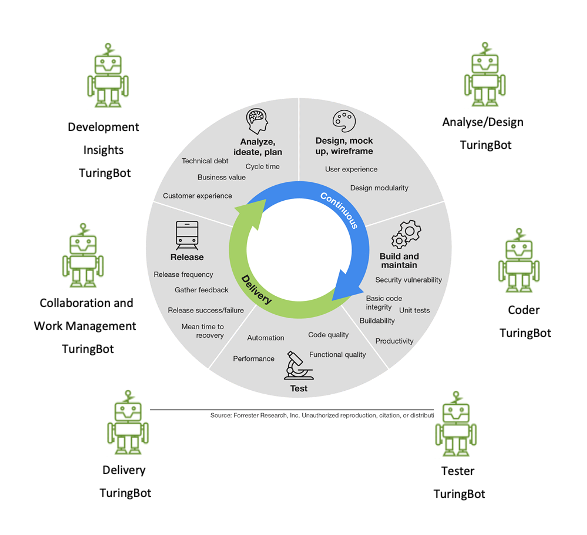Watch Out For TuringBots: A New Generation Of Software Development
AI has been conquering the digital universe and all its planets. It’s now landed on the software development planet, as well. It already did so a few years ago, but now it’s about to take off. No worries, and let’s be clear, if you are a designer, a developer, a tester, or even a product manager, AI software development TuringBots will not replace you, not in the near future nor in the medium one. But certainly, they will augment your capabilities and make you look and work smarter.
So What Are TuringBots?
TuringBots, coined by Forrester, are AI-powered software that can help software developers and entire development teams plan, design, build, test, and deploy application code. In the past, we have explored its possible potentials in a series of blogs (part 1, part 2, and part 3). This year, TuringBots are featured in Forrester’s top 10 technology trends of 2022 because we believe that they are giving birth to a new generation of software development.

And What Can TuringBots Do For You?
Depending on the development role, they can help during every stage of the continuous software development lifecycle. Analyze/design TuringBots can generate HTML5 code from handwritten user interface sketches during your UX team’s design workshops; coder TuringBots can look up technical documentation, share interface signatures with necessary parameters, and then auto–complete the code (i.e.: automate coding). Tester TuringBots can, for example, quickly automate thousands of visual tests over hundreds of web and mobile browser pages in seconds. Deliver TuringBots can automate configuration files for creating efficient DevOps pipelines; CWM TuringBots can simplify teams’ collaboration and share product/project information more effectively; and development insights TuringBots can augment all team stakeholders with data insights over quality, technical debt, business value, and more.
Are They Ready For Prime Time? It Depends …
Not all TuringBot types are ready for the prime time slot yet, but software leaders are already working with tester TuringBots and experimenting with coder TuringBots. On the other hand, the “big” software players are making their moves: Amazon with TuringBots in testing, deliver, and coding (CodeGuru, DevOps Guru, and Whisperer), Microsoft GitHub with its coding TuringBot copilot, Microsoft with a co-pilot for Power Automate, and IBM and Redhat with a deliver TuringBot called Project Wisdom. But there’s also smaller players like Tabnine with its coder TuringBot claim to have already generated 1.5% of the existing world code, as well as unit tester TuringBots Ponicode by CircleCI and DiffBlue. These are all just a few examples of the existing TuringBot products that we are monitoring.
How You Should Prepare
Over the next three to five (or more) years, TuringBots will develop and mature drastically. An example might be DeepMind’s AlphaCode, which goes beyond just writing code since it can read a half-page of a well-defined technical problem specification, solve the problem, and then generate the code. The devil lies, however, exactly in the “well-defined technical problem specification” detail, since TuringBots obey the rule “garbage in, garbage out.” Users of TuringBots will need to become very disciplined on how and what they ask TuringBots and pay attention to the code that TuringBots get trained on, how frequently they get updated, and if they respect attribution. Developers and development teams of enterprises, software houses, ISVs, and even system integrators will need to:
- Understand the technology. Grasp the impact and potential of TuringBots (knowing when to implement, experiment, or watch) on their existing software development approach and how they will impact existing roles.
- Adopt a strategy. Implement tester TuringBots, experiment with coder and deliver TuringBots, and watch TuringBots like AlphaCode.
- Stay aware. Read our research that will help you on your game-changing software development journey.
Forrester’s report, TuringBots Offer A Peek Into Next-Generation Development, digs deeper and helps you understand some of the above, with more research coming in 2023 to assist you with the challenges and opportunities with TuringBots. Do you have some end user experience with TuringBots? Reach out to dlogiudice@forrester.com, mgualtieri@forrester.com, and/or mkandemir@forrester.com.
(written with Merve Kandemir, senior research associate at Forrester)
